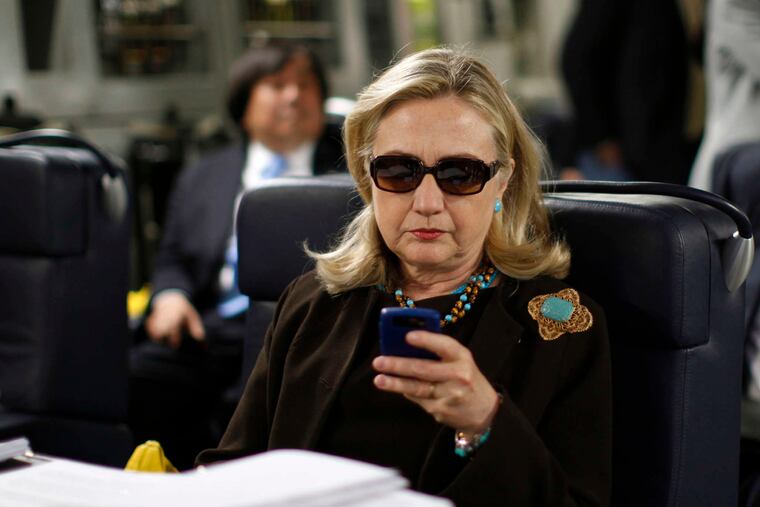BlackBerry’s classic smartphone stops working Tuesday
Old devices won't be able to send a text message or dial 911. You might still be able to play Brick Breaker though.

The classic BlackBerry is being forced to retire.
A pioneer of on-the-go email and paragon of corporate connectedness, it reigned supreme in the days when physical keyboards had yet to yield to touch screens. But come Tuesday, the cellphone turned status symbol will become one more relic of a bygone era as the transition to 5G wireless technology grinds forward.
After its “end of life date,” as BlackBerry calls it, devices running on BlackBerry’s legacy operating systems and software “will no longer reliably function,” the company — which has since pivoted to enterprise software and cybersecurity — reminded users in a news release in late December. Old devices won’t be able to send a text message or dial 911, placing them firmly in the realm of the arcane, in the company of floppy disks and rotary phones. You might still be able to play Brick Breaker, though.
BlackBerry was among the first devices to introduce the tension that came with eroding the boundaries between home and the office. The devices were beloved and derided for how hard they were to put down, earning them the moniker of “Crackberries.” The wars waged over BlackBerry use — in the movie theater, at the dinner table, during ballet recitals and T-ball games, while crossing the street — foreshadowed the endless tug-of-war for attention and presence that many face in the age of ubiquitous smartphones, social media and Slack.
Now, the device's demise is coming at a moment when the professional world is reckoning with the cost of being eternally reachable by your employer. More than a year and a half into the coronavirus pandemic, Zoom fatigue is rampant, and workers are leaving jobs in record numbers and reevaluating their relationships with work itself, citing burnout as one of the top reasons for quitting.
BlackBerry’s retirement is part of the so-called 2G/3G sunset, which is underway as carriers dismantle outdated and inefficient pieces of infrastructure — which were once the standard for connectivity — to make way for newer networks that are more secure, cost-efficient, and easier to maintain. AT&T, Verizon and T-Mobile are all slated to drop 3G services this year, but the road to 5G remains checkered with challenges and slowdowns, from regulatory hurdles to a lack of hardware and skilled professionals. The sunset will impact more than just flip phones: Many devices on the “internet of things,” from farming equipment to security systems to fire alarms, still run on 3G, and adaptation had lagged.
In its earliest iteration, the BlackBerry was not a phone but essentially a glorified, two-way pager, a “breakthrough wireless solution for mobile professionals,” according to its maker, Research in Motion. When the first version that could be deemed a smartphone arrived, in 2002, it required use of a headset.
For years, BlackBerry was top of the totem pole for personal technology, indispensable to politicians, celebrities and professionals alike. Kim Kardashian used to have multiple BlackBerries, just in case one broke, and President Barack Obama refused to give up his BlackBerry after taking office.
Research in Motion enjoyed years as one of the world’s top smartphone makers, and it led the way with such features as web browsing capability, predictive text, secure instant messaging, and Bluetooth. It was seen as a leader in security. But the company was slow to realize the value of apps and touch screens. As late as 2014, former BlackBerry chief executive John Chen was still insisting that the company’s strategy would “center more and more on the qwerty keyboard.”
But the devices sometimes left kids frustrated with their distracting effect on parents: A 2006 article in the Wall Street Journal, “BlackBerry Orphans,” featured a 4-year-old who tried to flush her mother’s BlackBerry down the toilet, and a ninth grader whose parents typed their way through her graduation ceremony and dance recitals. One Austin grade schooler said he was “very annoyed” with his mother’s BlackBerry: “She’s always concentrating on that blasted thing.”
The advent of the iPhone unleashed a tsunami of change in the smartphone market. Whereas BlackBerry had always catered to the corporate, work-addicted consumer who prioritized email, the iPhone offered an accessible interface that was appealing to those inside and outside the professional world.
After the iPhone debuted in 2007, BlackBerry’s stature eroded: Its market share slumped from 20% in 2009 to just 5% in 2012, according to Business Insider. By 2016, when the company ceased manufacturing the BlackBerry and shifted its focus to software, its market share had dwindled to zero as customers were bombarded by touch-based options from such competitors as Apple, Google and Samsung.
BlackBerry die-hards can sustain some hope for a comeback. Austin-based OnwardMobility is supposed to be releasing a 5G version of the BlackBerry, but it has been mysteriously delayed: Its website still says the revival is coming in 2021.